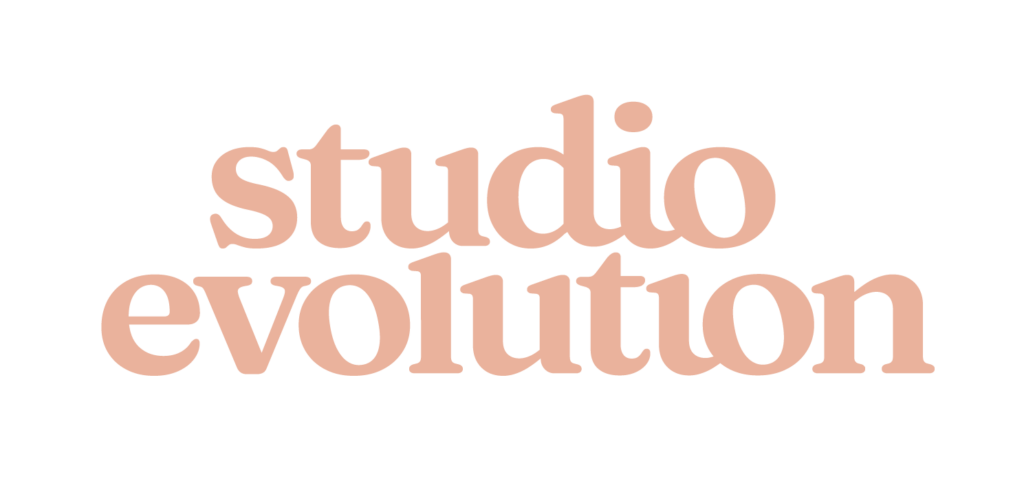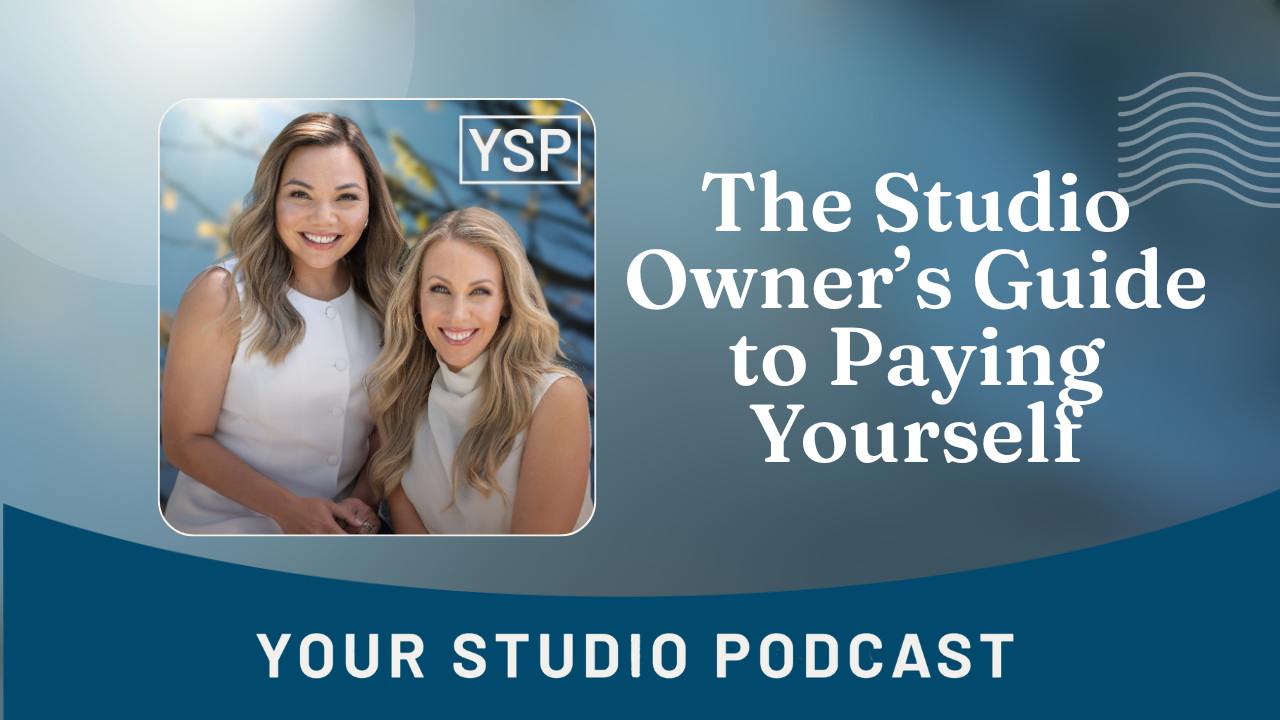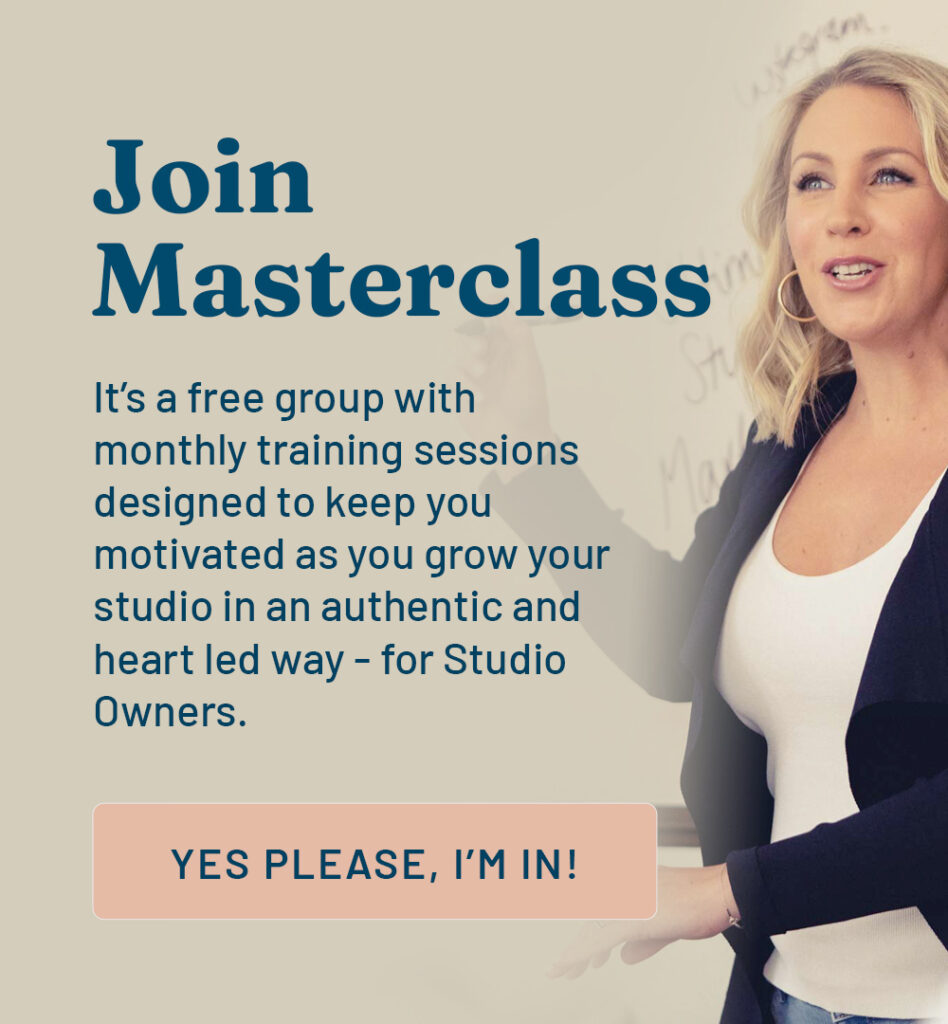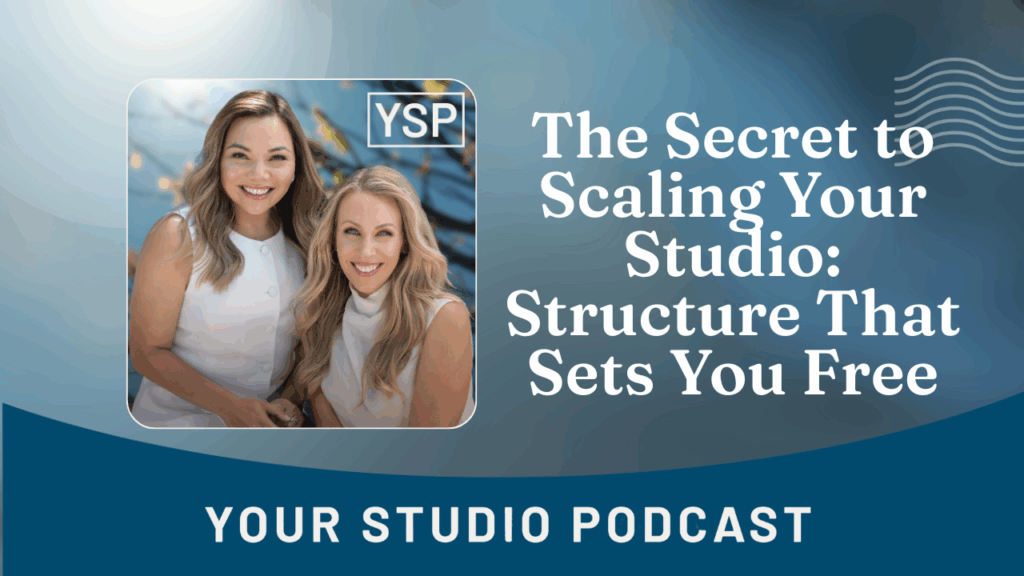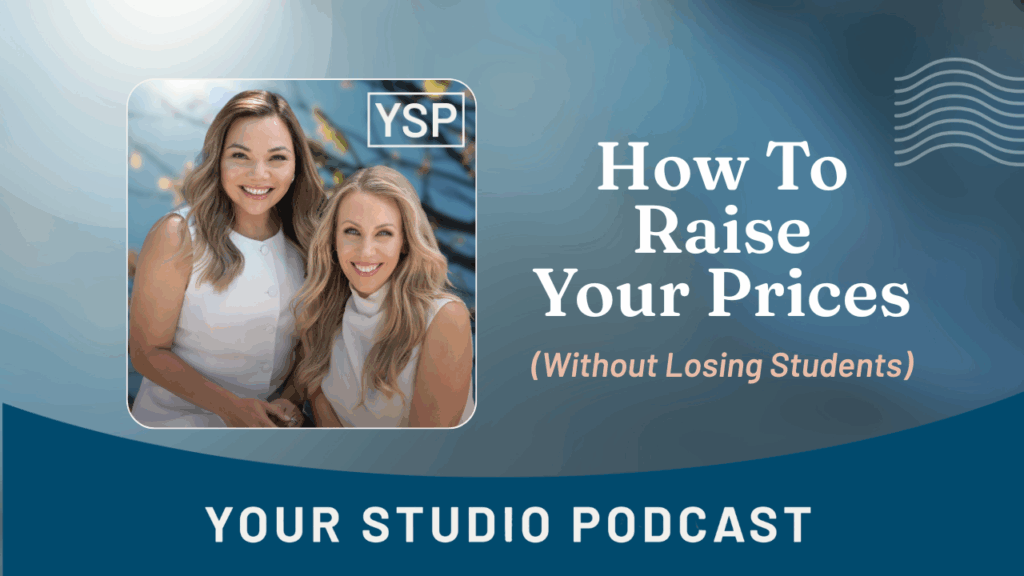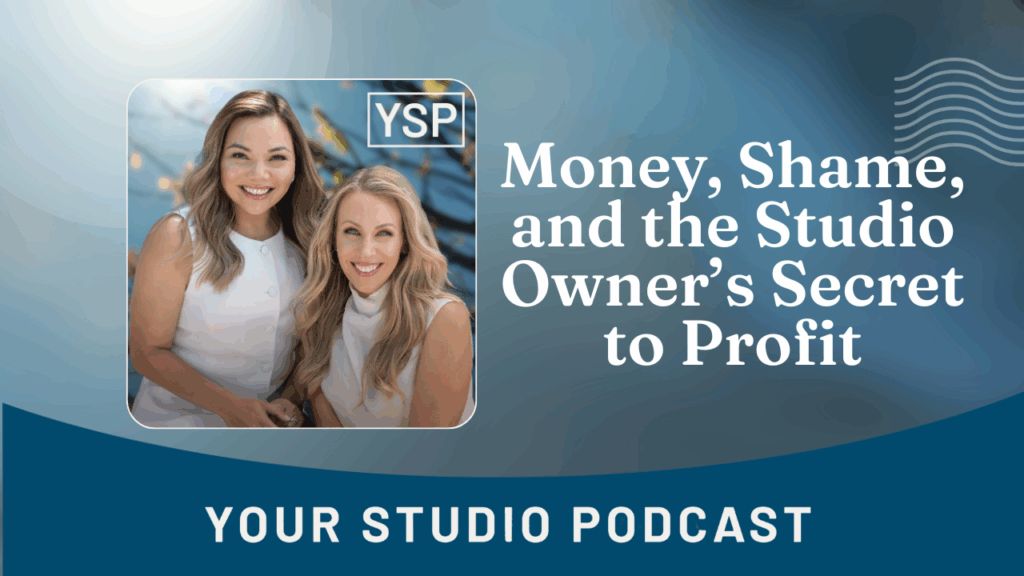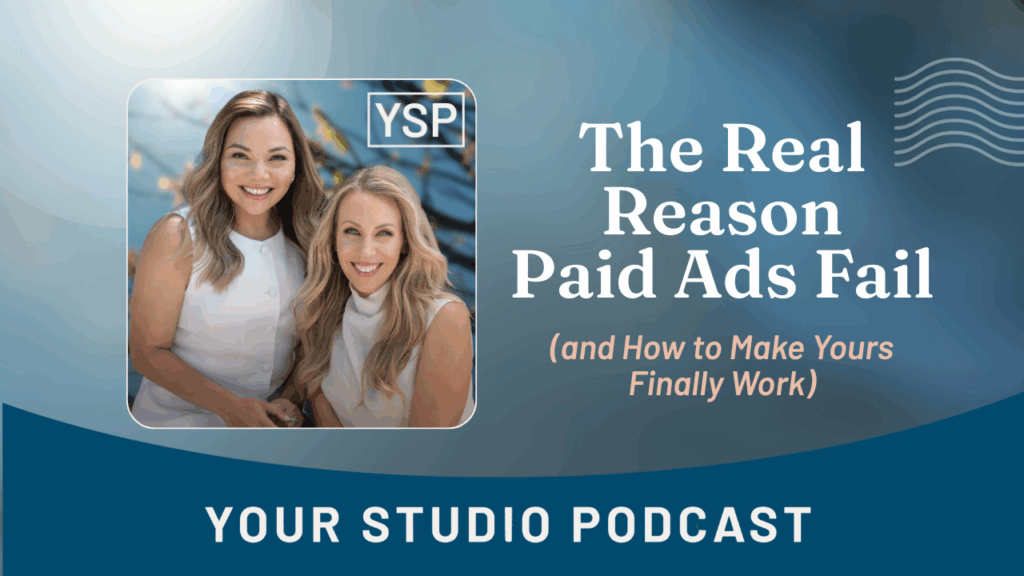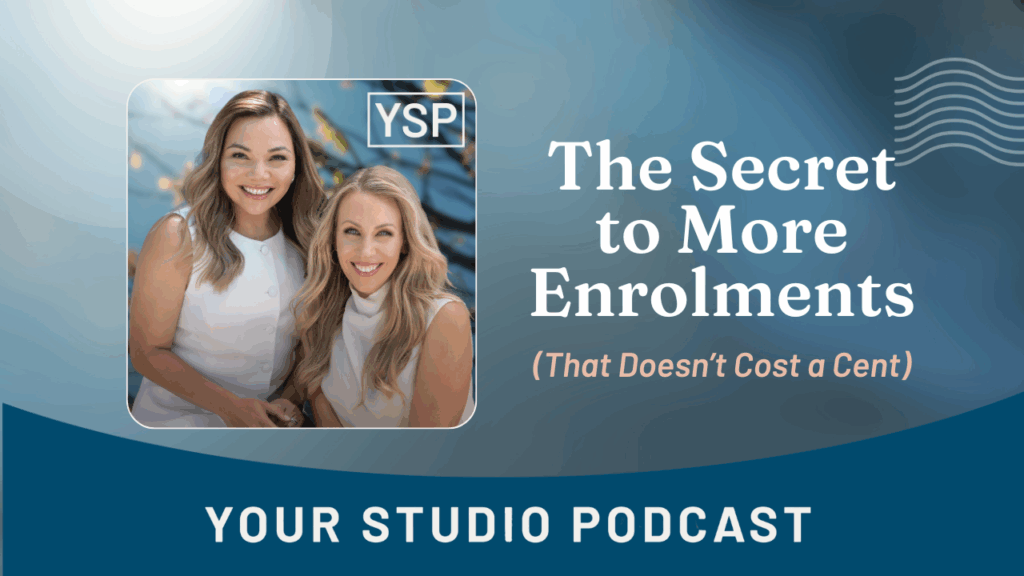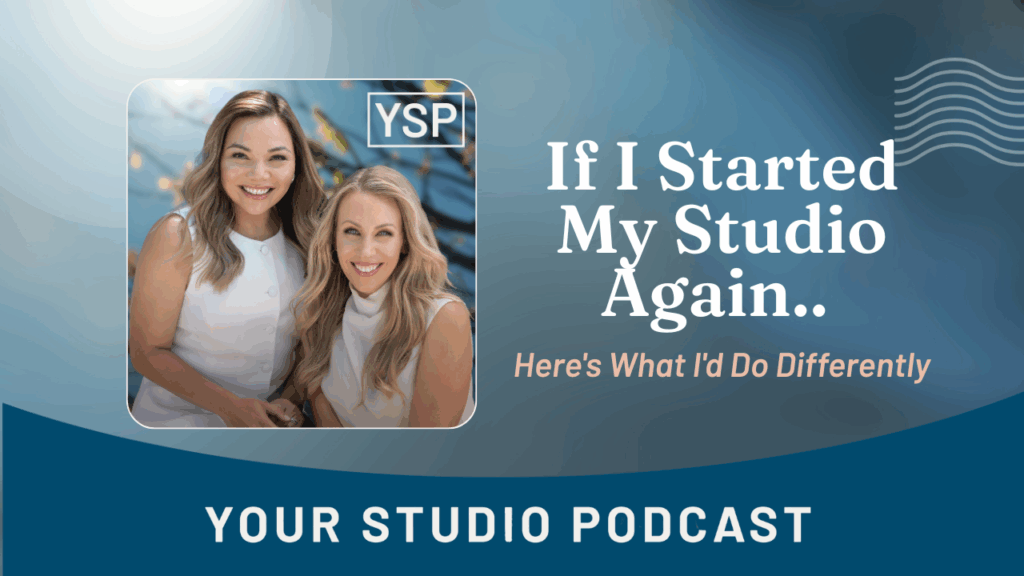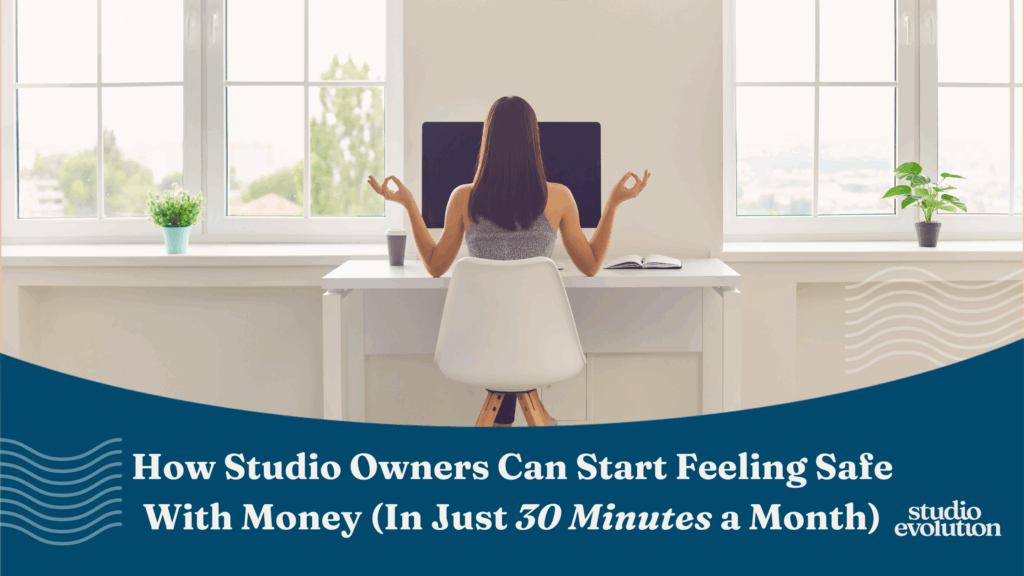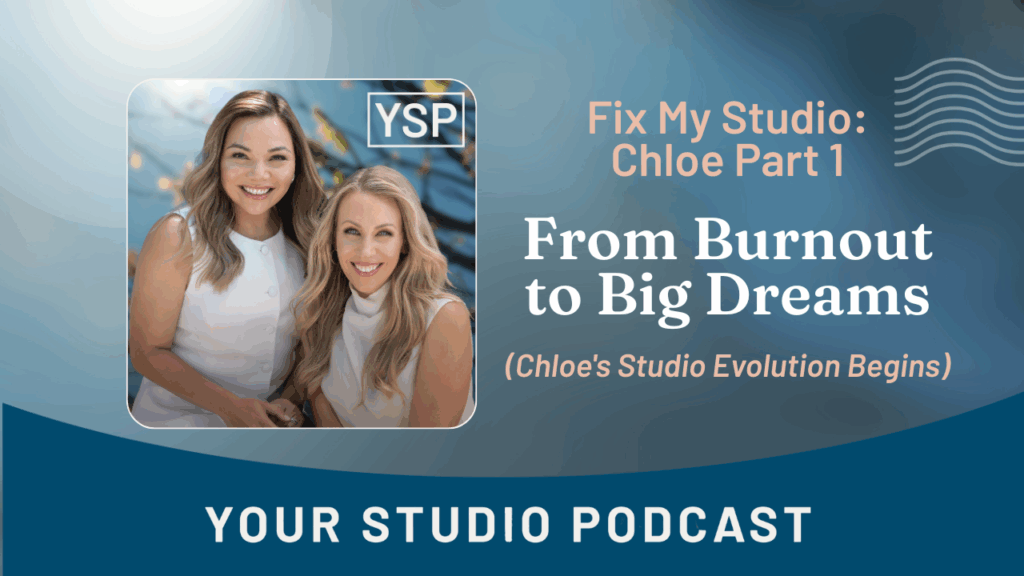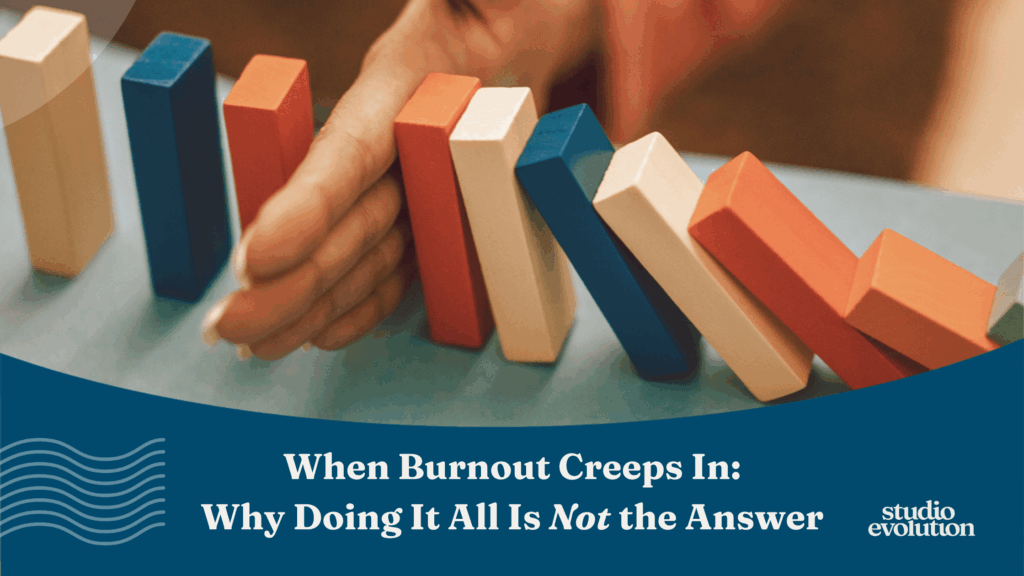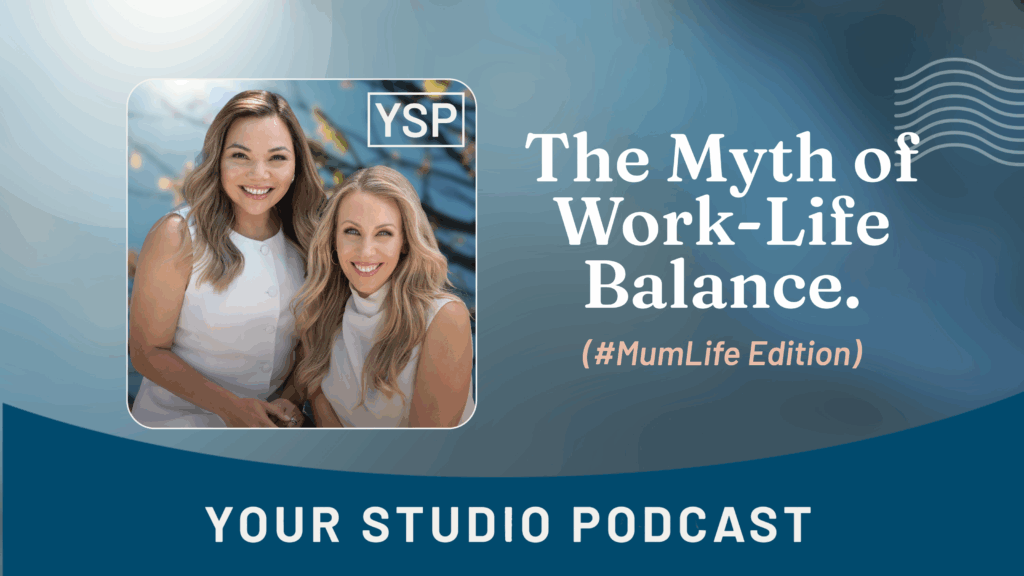If you’re running a studio you love but still not paying yourself what you deserve, this episode is your turning point. 💡
Chantelle Bruinsma and Michelle Hunter chat with Studio Evolution graduate Jordana Martin, who went from burnout to building two thriving Pilates studios — all while paying herself every single week. Discover how to create profit with purpose, reclaim your worth, and build a studio that truly supports your life.
Please subscribe + review!
Voicemail: https://www.speakpipe.com/LeaveEvolutionAVoicemail
Instagram: @thestudioevolution
YouTube: @thestudioevolution
Facebook: @TheStudioEvolution
Website: studioevolution.com/start
Chantelle Bruinsma (00:04):
Welcome to Your Studio Podcast, sharing strategies for studio owners. I’m Chantelle Bruinsma, here with Michelle Hunter. And together we’re the CEOs of Studio Evolution, where for over a decade we’ve helped thousands of Studio Owners around the world of dance, music, acting, art, yoga, and pilates studios transform their passion into thriving, profitable businesses. So if you’re a studio owner, grab a cup of tea and settle in. You’re in exactly the right place.
Michelle Hunter (00:34):
Hello friends, and welcome back to Your Studio Podcast. It is Michelle Hunter here with my work wifey, Chantelle Bruinsma, and we’ve got a bit of a treat for you today. We have a recently graduated Studio Evolution member, a powerhouse Pilates studio owner from the ACT. Welcome Jordana Martin.
Jordana Martin (00:52):
Thank you. Thanks for having me. So excited to be here.
Chantelle Bruinsma (00:56):
When you get a member come into your studio or a student coming to the studio, you’re like, oh, this is one to watch. This one was from the word Go. Her studio was only eight months old when you enrolled in Studio Evolution, Jordana, and it has been a huge journey watching you from when you started to now you’ve actually successfully opened your second location in just a bit over two years. So how are you, you’ve done a lot. You’ve done a huge amount in a short amount of time. Do you need a nap?
Jordana Martin (01:28):
So badly. Yeah. No, no, I’m going. I’m going really well. Yeah, I think the road to hell is paved with the best intentions right now. It’s all going really well. Some little hiccups here and there in relation to staffing and stuff like that. Just the teething issues. But overall, I think it’s been received really well and it’s growing rapidly. So that’s exciting.
Chantelle Bruinsma (01:58):
It’s really exciting. So to kind of step back a little bit, you were in corporate and work in the grind, and then you discovered Pilates. I remember you telling me the story that you did a from was like, what is this? And it was just changed your life. And just maybe just paint us that picture of that transition and what inspired you to really open your own.
Jordana Martin (02:17):
Gosh, it is going back a long time now. So yeah, it’d be about 15 years ago now. Yeah, I was in a corporate job and I was never someone who was, I played a bit of netball in high school, but I was never someone who was really a gym goer or anything like that. I had no idea what I was doing. I don’t like people to see me not knowing that I have no, not knowing what I’m doing. I really don’t like to be perceived as incapable or incompetent. So that’s sometimes I guess shut me out of starting things. But my friend was like, come to this thing. It’s near our house. It’s called Reformer. You start lying down and I was like, alright, done. Yes, let’s that, yeah. And it was great because you do, you start laying down and so you kind of start moving everything, but you’re like, well, I can’t see anyone else.
(03:07):
They can’t see me. So there was, so I just kind of got into it, and then by the time we start up and started doing other things, I kind forgotten about it because I kind of got me into a bit of flow. I walked out of there and I was like, I’m obsessed. I’m obsessed with this. Went straight to the counter and was like, I need to sign up, take my money. So I did that. I found out I was pregnant five weeks later after that. So then I did it all through, maybe through pregnancy. Yeah, I did it right up until 38 weeks. And then I was back there as soon as the doctor said I could go back to exercise. And yeah, I did that. I was doing that for a couple of years. And then someone there was like, have you ever thought about becoming an instructor?
(03:49):
And I was like, oh no, but absolutely yes. I said no. And then I went back to it the next day and I’m like, actually, yeah, I really want to be an instructor. So that kind of started through, started that way, and I taught alongside my corporate career for a long time. In my head I was like, one day I want to have have a studio, but the time has to be right. I think, I don’t know what the time needed to be, but at that moment I was like, I wasn’t quite prepared to take that risk. And so I just kind of did that alongside of things. And then during COVID, and I was working in the health space during COVID all of these years, and during COVID, actually in pharmacy accreditation. And so that blew up because we were like, how are we preparing these premises to do vaccinations against COVID? But it was a lot of work when some people found things decompress for them, we were insane. And I, towards the end of 2020, had just had a massive burnout episode. I couldn’t work for eight weeks, and I was like, yeah, I think it’s time for me to get out of corporate and open a business that doesn’t open during pandemics. So it was like, I dunno, solid
Chantelle Bruinsma (05:18):
Logic. Solid logic.
Jordana Martin (05:19):
It was really backwards, backwards. But I kind of thought to myself, well, I’m lucky in the health space. I know when the vaccines are coming. So I did actually go, I know that this is when they estimate that the Australian public is going to be vaccinated. Yes. And I also decided, I originally started with a home business and working in other studios, and I was like, I’ll give myself a year to see if I like it before I invest in
Chantelle Bruinsma (05:51):
Uhuh.
Jordana Martin (05:51):
Premises and all of that kind of thing. And I think within about five months of being out and I was like, I have to work for myself. I can’t. I can’t. Yeah, absolutely. Yeah. So that all happened and I opened my studio. Then in October of 2022, I was in my group studio, and then here we are, here are, there’s a whole lot of other stuff. It was just me and one other team member who worked three hours a week when I first opened. I’ve got a team of 12 now. My hours have just increased a little bit with opening the new studio. So I’m teaching 16 hours a week, but considering I started with 30, that’s,
Michelle Hunter (06:40):
Wow.
Jordana Martin (06:42):
Two locations down quite, yeah, two locations to only be doing 16 hours is not bad.
Chantelle Bruinsma (06:48):
It’s not bad at all. Not bad at all. So one of the things that I have been so proud of with you was that I know that one of your big goals, your big kind of milestones you wanted to get to was to replace your salary that you were earning in corporate through the studio, and you’ve got there. I mean, what would you say has been important in what you’ve prioritized and how you’ve made decisions that has allowed that to be become real?
Jordana Martin (07:12):
Yeah. Oh, that’s a really tricky one. I think even before I came into Studio Evolution, I was aware of the Profit first methodology like that. It was something that I kind of come across. So I had already, I guess, structured the way that I was managing my finances in such a way that I was putting aside some money for profit and some money for myself, first and foremost, and then doing everything else, which I know when people hear it, they’re like, that sounds backwards, but I guess if you do it the way I believe it’s supposed to be done, the idea is you pay yourself first. You put your profit aside first, and if there’s not enough left to do all the other things, then you’ve got to make more money. You’ve got to work out what levers you are pulling and what you’re going to do to bring in the money. So it’s not a case of I’m not going to pay myself. I’ll sacrifice myself at the altar of my studio because I just brings resentment. So yeah, so there’s never been a week since I opened my studio that I haven’t paid myself ever. There’s never been one week.
Chantelle Bruinsma (08:26):
Do you know there’s people listening to this, this is radical, radical not being studio owners. For many studio owners, what you’re saying is the equivalent of another language. It’s philosophically so misaligned because the feeling of obligation of all these other people and what the experience they want for the students, and there is such a lack of correlation of your worth and your contribution. It’s really interesting.
Jordana Martin (08:51):
And I think to be fair, I never was like, oh, I’m going to pay myself come hell or high water. The salary I want is up here, and that’s what I’m going to hit. I paid myself, and I’m a sole trader. So obviously there is some flexibility in relation to how you manage pay in that situation, but I always allocated myself a percentage week to week. So that meant it fluctuated, but only in line with how everything else in the business fluctuated. And some weeks might’ve been a little more feast and others a little more famine, especially when I first started. But yeah, I just always made sure I was paying myself because I didn’t want to be in the position where I was resenting my business. I felt like it was a dream that I’ve had, so I didn’t really want to make that dream dirty.
Chantelle Bruinsma (09:50):
It’s a really beautiful honoring actually, because that feeling of resenting the business is so toxic, and it’s also really, I see it every day with a lot of studio owners, the resentment away from the family and then the loss of opportunity financially. It’s real. It’s real. And you’ve decided upfront to not allow that to happen.
Jordana Martin (10:14):
Yeah. Yeah, totally. And I think I’m fortuitous in so far. I was like, obviously there’s people out there that they’re like, there’s no way I can afford my life if I can’t pay myself for one week. I’ve got long service leave paid out when I left my corporate job. So there was some financial buffer there, and my husband is also has a good salary as well. So I did have space to allow myself to be uncomfortable, and I think it’s worth acknowledging that. But then at the same time, I think that people sometimes that don’t have the space to allow, don’t have the space, still don’t pay themselves. And yeah, I don’t know. It’s that whole idea of burning the candle at both ends and all those kinds of things, and how do we, and money, it doesn’t solve all problems, but gosh, it solves a lot of them.
Chantelle Bruinsma (11:13):
Doesn’t it?
Jordana Martin (11:13):
In relation to like stress and all of those kind of things. And I think that by paying myself, then I also started to be like, well, if I’m paying myself just no problem, and I’ve still got money for the operating expenses and I’ve still got money to pay the gst, dah, dah, dah, then I’m like, oh, I can afford to pay, afford pay somebody else. Like I said, I had one team member doing three hours a week from the very start, which was not a lot, but I started building my team out pretty quickly. So I opened on the 17th of October, and I had hired another staff member by the Christmas of 2022. And then I think by the April I had a team of six.
Chantelle Bruinsma (12:01):
Wow.
Jordana Martin (12:03):
So it went pretty quickly. And I think the other thing with that in relation to paying, and I definitely have had this conversation with people inside Studio Evolution, people that were ing and erring about is it the right time to put on a team member? I mean, it’s difficult. Obviously you don’t know exactly anybody else’s circumstances, but in my experience, it was always like every time I added a team member, it was probably just a little bit before I felt super comfortable to add that team member. But there’s something woo about it when you kind of put it out into the world that you’re like, I’m going to employ this person and I’ll find the money. The money just kind of comes, which I don’t know why
Chantelle Bruinsma (12:55):
Leap and the net appears
Jordana Martin (12:57):
Exactly leap and the net appears is absolutely. That’s actually the thing that I said when I left my corporate job that was like, I’m going out into the world to test this, test, this theory that I can do this thing. And so I think that’s always been, so I think because I had that experience several times over of like, oh, it’s going to be uncomfortable to hire this person, but I’m going to do it. And it’s almost instantly the extra money that went to their wages came in and a little bit more every single time, which has also then put me in a position where I guess I have a little bit more trust in taking other risks in the business, opening a second one when my studio’s two and a half years old. And that had been the end of the five year plan, not the end of the two and a half year plan, but yeah.
Chantelle Bruinsma (13:45):
Right. Well, yeah. Jordana joined us in Horizon House in Bali last year for our retreat, and we’re working on five-year game plans. You’re like, I’m just going to condense the timeframes here. But you were ready. You were ready, and you knew your numbers. You knew the kind of stability had already created, the team was solid. You were actively ready to step in towards it. It’s exciting.
Jordana Martin (14:06):
Yeah, it’s exciting. It was very much something I did still think it would take in my head. When I was in Bali last year, I was very much, I was thinking October this year, I would start in earnest to look for spaces that would be suitable to open a second business. But my neurodivergent hyperfocus, I also was immediately started obsessively looking at real estate, at real estate listings. I was like, well, what’s going, how much is it per square meter for what locations? Those kind of things.
Chantelle Bruinsma (14:48):
And I remember you being so clear on you to have a cafe, it needed to have by the parking, your criteria for the convenience for your clients was paramount.
Jordana Martin (15:02):
So I don’t know, some people might be like, that’s such a random list of things, but
Michelle Hunter (15:06):
No, no, it’s so great and intentional.
Jordana Martin (15:09):
I think part of it was in addition to, I want free parking, I want there to be a supermarket, there needs to be some kind of health pharmacy. It needed to be a little hub because I think it’s harder to draw people to, if something’s a destination in and of itself and there’s nothing around it. And I mean with the new space, it’s been great because the cafe next door to us, they actually approached me as soon as they heard I was opening. And they’re like, oh, you want to do something? And so they do a discount for anyone who’s just been to a class, they can go straight next to grab a coffee or a meal. So that’s worked out really well. But I think the other thing, I didn’t just be like, there’s got to be free parking, and that’s just the best. There was more strategy in it, I must say, checking on things like using the a BS statistics, what’s the median income for the area? And the average person living in the area are, do they have a mortgage? Do they have school aged children? So they’re less likely to be moving out of area anytime soon. So there was a lot of things that I thought about with my first one, and ergo the second one to be like, how can I make sure that I’m tapping into essentially a group of people that are me
(16:42):
And that won’t be moving out of it? How can I create relationships that should ideally mean that I’m signing up really long-term clients? Because people with children in school don’t generally tend to move far because they want to avoid those disruptions to their kids. So it’s kind of like, do they have a mortgage? Do they have high disposable income? Do they have kids at school? That’s what makes up the most of the population in that area. Cool. That’s a good place. And there’s free parking, so let’s open a studio there.
Chantelle Bruinsma (17:12):
It’s really, really strategic. And I think that it’s probably the underlying kind of element that really creates success too for studios if that location you’ve chosen has, I mean, what we’re seeing above and beyond is that in society today, people are so exhausted and so stretched thin that they need the most convenient choice. So if your studio doesn’t provide convenience and allow them to pick up some sausages for dinner on the way home, whatever you’re going to do for the kids, if you don’t allow that ease, it’s a one little barrier. And we just don’t want any barriers to businesses. So I think it’s incredibly interesting conversation of what is the appropriate strategy for venue selection that is going to set you up for success from the word go from the word go.
Jordana Martin (17:59):
Yeah. And I think particularly if your ideal client is your yourself, obviously I think with dance studios, it’s a little bit different if they’re working with children and stuff like that.
Chantelle Bruinsma (18:10):
It’s the younger self, it’s the younger self.
Jordana Martin (18:12):
But I think if it’s someone like yourself, which is obviously something I think a lot of Pilates studio owners would probably be targeting, the demographic would often be themselves. Think about the things that you really don’t want to do, the things that are inconvenient and would be barriers to access for you. Or just be like, oh, there’s so many things even in the way preferencing weekly, weekly memberships that are just direct debit. So they don’t have to pay an invoice, they don’t have to think about it. It’s just coming out, but it’s coming out often. So they’re having this little reminder of, oh, I’ve paid for my Pilates, I should make my bookings. And all of those kind of things that are kind of making all the barriers that would stop me from doing something. I was like, get rid of those, buffer them out as best as possible.
Chantelle Bruinsma (19:04):
So if you had a studio owner who was maybe in a stage where they were looking to start the studio, or maybe even they’ve got a studio, but they’re wanting to really, you’ve been a case study in fast growth, you’ve been a case study in that, I think it’s fair to say. But if you are looking at your approach, what would you want your owners to know? What’s the biggest thing to focus on or the biggest thing to disregard or overcome? What advice have you got?
Jordana Martin (19:36):
I think..
(19:40):
I dunno how to say this eloquently. I think if it feels shit to you, it feels shit to your customers. So if it feels like a pain point in the backend, it’s almost certainly feeling like a pain point on the front end. So for me, I think, and this was probably an advantage for me, coming from a background in accreditation, so being really into policies and procedures and systems and stuff like that was, but for me, I’m like, get your systems as tight as you can as early as you can. And so if it’s someone who’s opening, if they haven’t opened yet, I’d be like, I opened with policies and procedures. I had one team member. I could have just been take the sign out when you open. But because I also thought to myself, once I open, I’m not going to have as much time to work on these things for a little while.
(20:37):
So it was actually in the weeks leading up to opening, I developed those things because I was like, it will always be easier to go back and edit them. And I think now, and I mean, yes, the AI was around then, I was quite resistant to AI for a while. I still have some ethical issues with it in relation to resource demand, but I think you can, if you’d be realistic about your own resources and the demand on yourself, yes, then I would be use, that could be something that took me days. Someone could actually be writing probably an entire suite of policies and procedures in a day
(21:25):
Using AI. So I would definitely be like, don’t be a martyr. I was. Yeah. And I think that would be the biggest thing. And outsource as soon as you can, especially with things you don’t want to do, anything that’s going to make you resentful to your business or something that you’re like, this just takes up so much time that I don’t have. And again, yes, it will cost you money, but generally my experience has been like if you put money into something, you’re kind of signaling to the universe, I expect this to work out. Please, please return the favor. Yeah.
Chantelle Bruinsma (22:04):
It’s bold. I really love you holding the resentment piece and honoring it.
Jordana Martin (22:08):
Oh, so much. I think I’m a resentful person naturally.
Chantelle Bruinsma (22:13):
I just think it’s wise. I see a lot of resentment in studio owners who have given decades of their life to this business and not received much. They’re giving, but not getting. And it’s probably honestly a real negative trait that I see. And it’s not from lack of love and devotion, but it’s just the toll that these studios have taken on the business owners. So it’s real. It’s real. But to consciously go, I get to make choices. I can allocate a percentage of my salary, even if that works out to be $75 a week this week. If that 1% that I can allocate to myself is that, then I’m going to do it. I think it’s really wise to have boundaries in place of how you want to feel inside your own studio, inside your own business.
Jordana Martin (22:59):
And I think to be clear, there are still times when I’m maybe a little bit resembled my studio because we open at six o’clock in the morning. So when I get a text message at 23 past five in the morning, I’m sick, I can’t come in. I’m like, all right, this is my emergency. There are those times. And I’m like, ah. But at the same time,
Chantelle Bruinsma (23:20):
So do you have to be awake from 5:00 AM in order in case you do?
Jordana Martin (23:24):
I don’t sleep anyway. Yeah, no, I’m a fairly light sleeper, so I do generally put my phone on do not disturb. So emails and stuff coming through wouldn’t get me, but all of my team’s numbers can come through my do not disturb. So they know and they do actually message straight to a team WhatsApp. And you’d be surprised how many of my team are awake at 23 past five. So yeah, there’s quite often someone who will be like, I’ll be there by six.
Chantelle Bruinsma (23:53):
What a team, dream team.
Jordana Martin (23:54):
Yeah.
Chantelle Bruinsma (23:55):
I don’t know how many of our team would be I’m out.
Jordana Martin (24:01):
Yeah. Yeah. But it is one of those things I think because especially when that happens at the start of the day, it’s different if someone’s like, oh, I’m calling in sick for my afternoon class. But at the start of the day, obviously you start your day with a lot of cortisol and a lot of, I’m a bit frantic and I’m doing something I didn’t plan for. And I tend to be, if I’m working in early morning, I actually strategically build in what I call existing time. I need time to exist before I go and be with people. So I actually build enough time into my morning process that I could literally sit on the couch for 10 minutes and just stare at the wall and be like,
Chantelle Bruinsma (24:40):
Lovely.
Jordana Martin (24:40):
Yeah, yeah, right. My family’s not awake, nothing’s happening. There’s normally a cup of coffee or a cup of tea or something like that. But I just, yeah. Whereas when those days happen, when I get called in, then I don’t have that. So I always like, oh, I didn’t get to exist this morning. You
Chantelle Bruinsma (24:57):
Didn’t get to exist this morning. But even we’ve actually recently just kind changed a little thing of how we’re doing in institute evolution, Michelle, we’ve kind of had communication a window for Michelle because she was waking up at 6:00 AM texts that would kind of flare the nervous system and go, go, Christ has got to put this stuff out and it’s not a nice way to start the day, Michelle.
Michelle Hunter (25:20):
It’s not. And even being strict on those boundaries as well. And even you said outsourcing Jordana, we’ve got a saying in Studio Evolution, don’t we who not how?
Jordana Martin (25:31):
Yes
Michelle Hunter (25:31):
Just honoring that when you said you have the trust of when you hire, the money will follow, and also how much time you could have spent trying to do that task, eating days away and continually increasing your stress.
Jordana Martin (25:47):
And I think something that I worked out pretty early on, and this is because I’ve got a neuros spicy brain, I cannot transition from being in the studio to doing strategic work that cannot happen on the same day.
Chantelle Bruinsma (26:00):
Should I tell the same, I’m exactly the same. If I talk to someone, my brain’s gone.
Jordana Martin (26:04):
Yeah, great. I’m working with porridge now. And so that was something I worked towards doing really quickly was trying to consolidate. So the hours that I do teach are all batched together rather than I think a studio owner. His life is a little bit Swiss cheese anyway, I think that’s how we work. But yeah, really trying to consolidate the teaching hours so that I could have that time to focus on more strategic work. And it’s always to fall into doing the tick and flick stuff
(26:47):
First. There’s a bit of dopamine in achieving something and getting it off your plate quickly. But I think over time I definitely was like, I don’t need to be the one that’s updating the schedule if someone’s going on holidays and stuff like that. So we put out all our cover requests into Trello and my admin picks those up and makes the updates in the system and stuff like that. So I just kind of loosely monitor to make sure that someone’s actually said they will cover it, but I don’t have to do all the backendy bits. So I think the hardest thing for me to outsource was getting my marketing stuff, which I’ve actually, I’ve wanted off my plate for so long because it’s definitely not my genius zone. I find it quite stressful to generate content. I want to consume it, I don’t want to make it.
(27:39):
But I also am very particular about, I think there’s a lot of things out in the world about what people perceive Pilates to be. And then I’m kind of over here and I’m like, oh yeah, but with science, and when you ask someone who doesn’t know anything about the science behind movement and stuff like that, then you get a lot of this stuff over here. And so I did try a couple of times I was like, oh, that’s not my voice, that’s not my tone. I wouldn’t say that that’s not accurate. And so I was having to redo, but this is kind of circling back to the also using AI thing. I just in the last few weeks went to a session to learn how to build AI assistance. And so I built an AI social media bot. Cool. And a newsletter bot and a blog bot. And I did some training with them and then I took them and I gave them to a marketing person. And I’m like,
Chantelle Bruinsma (28:38):
That’s me now.
Jordana Martin (28:40):
Yeah.
Chantelle Bruinsma (28:40):
That’s awesome. And are you happy with what it’s creating?
Jordana Martin (28:45):
Well, this month will actually be my first test. For me, it’s not so much the word generation, it’s visuals. I don’t like doing the creative.
Chantelle Bruinsma (28:57):
Yeah,
Jordana Martin (28:58):
I have no problem with making words, but
Chantelle Bruinsma (29:02):
Yeah, the image is going to be right too. Yeah,
Jordana Martin (29:04):
Yeah, exactly. Right. But that’s exciting. So there are ways and means, and I think that definitely AI is also making more and more things possible to feel like it’s still going to be aligned with your brand, but allow somebody else to do it
Chantelle Bruinsma (29:19):
Unbelievably. And again, the more it’s that upfront investment, the more we spend on the priming and building the influence of our philosophy and our values and our tonality, then it just becomes faster and faster and faster. It’s funny, even in my chat, DBT account, a team member could do something and then I’ll put it into mine and it just automatically just ticks it in. But it’s again, making that leverageable for the whole team.
Jordana Martin (29:42):
Yeah, no, it’s been great. I was like, oh, I wish I learned this sooner. I was doing my profit plan, my forecasting yesterday.
Chantelle Bruinsma (29:51):
Oh, good on you.
Jordana Martin (29:51):
Yes, I know. I was like, oh, this is my favorite pillar that you’re in at the moment. The positive prosperity sounds. I’m like, it’s sad to be there, but I was like, huh, I’m going to build the CFO. So I did that before I started.
Chantelle Bruinsma (30:07):
I love that. Good on you.
Jordana Martin (30:10):
Yes. So I don’t know. So it’s been good. I think the other thing we Studio Evolution. I suppose I should touch on that a little bit since we’re here. I think there are a lot of things that, there’s always this emphasis on efficiency and trying to smooth the crunchy bits and all of that kind of stuff. Some of these things I’ve learned after finishing up at the end of last pillar. But I think it is set a really nice foundation for me as well. And I think I’m also now kind of starting to be like, alright, I’m going to go back through the projects now in my own time, but now with more space, more studios and see if there’s things, well not see if there is, there will be, what can I tighten up? And to start to focus on that. I think when you’re in it and you’re like, oh, I’m doing all these projects and yeah, it’s a lot. So it’s now coming through that second time with that lens of a bit more experience and a bit more spaciousness to see. I
Chantelle Bruinsma (31:17):
Mean, I like to say another level, another devil. The projects like we’ve got your binders behind you and the principles in that will last you decades. But it’s how where you are right now in it, that kind of and org chart is always going to be revisited. Profit pilot’s always going to be revisited. You’re probably going to be looking at your roadmap and things like that. There’s always going to be tweaking, but it’s a good foundation for you to have and you’ve just utterly thrived. And we cannot wait to go to Thailand with you in just a few weeks. Eat chicken on a beach. We’re so excited. We’re so excited. At
Jordana Martin (31:56):
Least specific that we’re eating chickens.
Chantelle Bruinsma (31:58):
No, I have a vision of Pad Thai and Chicken skewers Chicken.
Michelle Hunter (32:05):
Chicken skewers, Jordana.
Chantelle Bruinsma (32:08):
I’m just really in sunsets and it’s going to be magic. Can’t wait.
Jordana Martin (32:13):
I’m very excited for that. I’m also very excited for whatever it is that you’ve got coming. I know you’ve got something
Chantelle Bruinsma (32:18):
Jordana.
Jordana Martin (32:19):
The future. I know publicly. No, that’s why I’m waiting in the wings for it.
Chantelle Bruinsma (32:26):
I tell you what you were saying earlier about the whole accountability, I think it was mostly an offline conversation, but yes, we’ll be launching our high tier for our Grad level program. You’ll be receiving invitation at Horizon House. I’ll put it that way.
Jordana Martin (32:40):
Yes. Because I think, yeah, I do that. The accountability is certainly something actually, that’s something I didn’t touch on when you were like, what about if people are starting? I would say get coaching as early as possible. I think this is something I heard from a podcaster and she’s a fitness coach in the US and stuff like that. But I was listening to her podcast when I first opened my business and it kind of goes along the same lines of what I was talking about about hiring staff before you feel quite ready and that kind of thing. And she was like, if you are never prepared to invest money into things that are supposed to help you become successful, you are already signaling to yourself that you expect to fail. So, wow. Yeah, and I think I should curate her. She’s Jill Fit is her podcast, but yeah.
(33:39):
Yes. But that really resonated for me. I think sometimes it’s uncomfortable, these investments for good coaching, it’s not small investments. I think that’s something that needs to be acknowledged. I feel like it’s, the money thing is obviously often a barrier for people of where am I going to find that money and what if I don’t like it and all that kind of thing. But I think, well, for starters, for me, when I saw the money for this, my experience with Michelle, not this Michelle, although this Michelle is fabulous as well, or my experience with Michelle Shaper
(34:11):
Going through getting the kind of discovery call, I guess I had no hesitations. And this was a significant amount more than the coaching program that I was in before which I left halfway through because I was like, this is not, but that spend was making me uncomfortable because I was like, I’m not getting what I need from it. Whereas for this straight away, after I met with Michelle, I was like, I have no hesitation to give my money to that because I know that I’m going to get what I want from it. And I did, and I have, here I am on the Podcast.
Michelle Hunter (34:46):
It’s been
(34:46):
beautiful
(34:47):
to watch.
Chantelle Bruinsma (34:47):
So great. And to think what you’ve done in three bloody years.
Michelle Hunter (34:52):
It’s crazy.
Chantelle Bruinsma (34:53):
It’s really exciting. It’s really exciting because anything’s possible for me. I know you’ve got beautiful visions of what’s ahead and stepping to third locations and things like that in time. But how you’re thinking and how you are making decisions and how you are prioritizing yourself in amongst the happy chaos of expansion is just beautiful. And we are really bloody proud of you because Thank you. What you’ve achieved is quite extraordinary in the rate that you have. And we’re just cheering you on chicken skewer in hand,
Jordana Martin (35:24):
Chicken skewer. Well cheers with our skewers. Cheers.
Chantelle Bruinsma (35:28):
We can’t wait. Well, thank you so much for being with us, friend. You are just a dream. And Michelle, what was your biggest takeaway from this little chat?
Michelle Hunter (35:37):
Just the discipline from the beginning. Just Jordana paying herself and then putting the profit aside as the studio grows. It just turned into cream on top. So I just really admire that discipline going through and honoring yourself from the beginning.
Chantelle Bruinsma (35:52):
I really like the whole conversation around resentment and acknowledging you have choice and not allowing it to get to that point and think, what have I got to do to how I keep and preserve my joy and my connection to this business to be healthy? That I think is really cool. Insight. Good times, good chats. Thanks Jordana hon. We’ll see you next time for our next episode of Your Studio Podcast. And if you could like to join us in Studio Evolution and go through the pillars and all the projects that Jordana has kind of indicated, head on over to studioevolution.com/apply and we can have a chat. Thanks, lovely one. See you next time. Bye.
(36:29):
Love what you’re hearing and want more. Make sure you subscribe so that you never miss an episode. And the good news is that we’ve pulled together a bundle of our most popular resources from marketing and retention to pricing and systems all in one place for you to binge inside. You’ll find videos, tools, and templates waiting for you. Everything you could need to start creating growth in your studio right now. All you got to do is visit studioevolution.com/start and dive on in.
